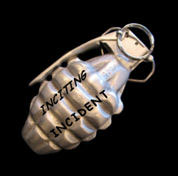Pinpoint The Inciting Incident For Your Documentary
Have you identified the inciting incident that will launch your documentary’s story line? Pinpointing this key narrative plot point is critical to editing a great first act.
First, a definition: the inciting incident is the event that throws your protagonist’s life out of balance and gives rise to their quest. For instance, when Harry Potter receives a letter inviting him to wizardary school, his guardians forbid him, but he becomes determined to go.
The problem that one of my filmmaker clients recently faced in finding the catalyst event was compounded by the fact that she was making a personal documentary. Looking back at her recent life, there seem to be several possible inciting incidents that gave rise to her desire to pursue a career revitalizing education for Native American children.
She kept asking herself questions like, “Was it my mother’s insistence that I get a real job?” “Was it my father’s reluctance to pay for more education?”
I reminded her that the inciting incident is an incident, that is, a specific event located in space and time. Her mother’s monotonous insistence that she get a real job was more accurately framed as part of the “setting” of the film.
Her father’s reluctance to pay more money for graduate school also falls into the category of “setting” — unless there was a specific incident in which he said, “There’s no way I’m giving another penny toward your useless education!”
In other words, a conversation or an argument can be an inciting incident, if it’s life-changing.
I encouraged her to search her memory for other things that gave rise to her desire to provide education to Native American children.
Was it a book she read? Was it a film she saw? Was it someone she met? Was it her realization one morning that if she wasn’t going to do it, who would?
As she sifted through the events of her recent past and shared them with me, what popped out to me was the fact that she had been fired at her latest job because, essentially, her soul wasn’t into it.
This led her to examine what she really wanted out of life
Getting fired, getting a diagnosis, getting a letter in the mail — these are all specific events that occur in a specific location and at a particular point in time. They are disruptive events. They throw your protagonist’s life out of balance. And this feeling of vertigo leads to a quest to restore equilibrium to one’s life.
If you simply can’t find an incident that meets those qualifications, then look for what editor Ken Schneider calls a “representative anecdote“. This is a little moment, often in someone’s childhood, that represents the impulse toward a future goal.
This technique works particularly well for biopics. In fact, I used this approach in my PBS biography about the late Marlon Riggs, a controversial filmmaker.
The film starts with Marlon on camera relating how when he was a little boy, he would look up at the stars at night and think, “I’m going to be somebody!
This statement of intent, or “representative anecdote”, is later supplemented by his mother’s comment. After watching her son’s speech at school, she used to say about her eloquent youngster, “That boy’s goin’ be a preacher!” She was right; he became a controversial filmmaker
To learn more about how to use an inciting incident as well as other plot points in a compelling narrative structure, check out my online seminar, “The Ultimate Guide To Structuring Your Documentary” at
https://newdocediting.com/products
For a limited time, buy “The Ultimate Guide to Structuring Your Documentary”, and you’ll also get my other two most popular courses for free.
